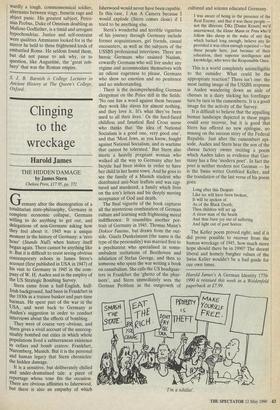Clinging to the wreckage
Harold James
THE HIDDEN DAMAGE by James Stern
Chelsea Press, f17.95, pp. 372
Germany after the disintegration of a totalitarian state-philosophy, Germany in complete economic collapse, Germans willing to do anything to get out, and delegations of non-Germans asking how they feel about it. 1945 was a unique moment in the history of Germany: a 'zero hour' (Stunde Null) when history itself began again. There cannot be anything like it. But it is difficult to resist seeing obvious contemporary echoes in James Stern's account (first published in USA in 1947) of his visit to Germany in 1945 in the com- pany of W. H. Auden and in the employ of the US Strategic Bombing Survey.
Stern came from a half-English, half- Irish background, had been in Frankfurt in the 1930s as a trainee banker and part-time barman. He spent part of the war in the USA, and went back to Germany at Auden's suggestion in order to conduct interviews about the effects of bombing.
They were of course very obvious, and Stern gives a vivid account of the unrecog- nisably bombed out cities in which whole Populations lived a subterranean existence In cellars and bomb craters: Frankfurt, Nuremberg, Munich. But it is the personal and human legacy that Stern chronicles: the hidden damage.
It is a sensitive, but deliberately chilled and under-dramatised tale: a piece of reportage whose tone fits the occasion. There are obvious affinities to Isherwood, but there is also an empathy of which Isherwood would never have been capable. In this case, I Am A Camera because I would explode (Stern comes close) if I tried to be anything else.
Stern's wonderful and terrible vignettes of his journey through Germany include former acquaintances, girl friends, casual encounters, as well as the subjects of the USSBS professional interviews. There are heroic Germans who resisted Nazism, cowardly Germans who will live under any regime and accommodate themselves with an odious eagerness to, please, Germans who show no emotion and no penitence and no understanding.
There is the incomprehending German clergyman on the Poles still in the fields: `No one has a word against them because they work like slaves for almost nothing, and they love it. It's what they've been used to all their lives.' Or the hard-faced childless and fanatical Red Cross nurse who thinks that 'the idea of National Socialism is a good one, very good one', and that 'Most Jews, as you know, fought against National Socialism, and in wartime that cannot be tolerated.' But Stern also meets a heavily pregnant woman who walked all the way to Germany after her bicycle had been stolen in order to have her child in her home town. And he goes to see the family of a Munich student who distributed anti-Nazi leaflets and was cap- tured and murdered, a family which lives on the son's letters and his deeply moving acceptance of God and death. The final vignette of the book captures all the mysterious combination of German culture and learning with frightening moral indifference. It resembles another por- trait of Germany in 1945, Thomas Mann's Doktor Faustus, but drawn from the out- side. Gisela Dunkelmann (the name is the type of the personality) was married first to a psychiatrist who specialised in somn- ambulent recitations of Beethoven and adulation of Stefan George, and then to someone who spent the war writing a book on cannibalism. She calls the US headquar ters in Frankfurt the 'ghetto of the phar- isees', and Stern immediately sees the German Problem as the outgrowth of cultured and solemn educated Germany.
I was aware of being in the presence of the Real Enemy, and that it was these people not the illiterate DKs [Damn Krauts] we'd interviewed, the kleine Mann or Frau who'd follow like sheep in the wake of any dog which barked long enough, believe any lie provided it was often enough repeated — but these people here, just because of their education, their superior intelligence and knowledge, who were the Responsible Ones.
This is a world completely unintelligible to the outsider. What could be the appropriate reaction? There isn't one: the most lasting image of the USSBS response is Auden wandering down an aisle of cheeses in a dairy sticking his forefinger turn by turn in the camemberts. It is a good image for the activity of the Survey.
It is difficult to believe that the appalling human landscape depicted in these pages could ever recover, but it is good that Stern has offered no new epilogue, no musing on the success story of the Federal Republic. Just after the camembert epi- sode, Auden and Stern hear the son of the cheese factory owner reciting a poem which Auden takes as evidence that Ger- many has a fine 'modern poet'. In fact the poet is neither modern nor German — he is the Swiss writer Gottfried Keller, and the translation of the last verse of his poem goes:
Long after this Despair Like ice will have been broken, It will be spoken of As of the Black Death; Then children will set up A straw man of the heath And thus burn joy out of suffering And light out of past horror.
The Keller poem proved right; and if it did prove possible to recover from the human wreckage of 1945, how much more hope should there be in 1990? The decent liberal and homely burgher values of the Swiss Keller wouldn't be a bad guide for our own times.
Harold James's A German Identity 1770- 1990 is reissued this week in a Weidenfeld paperback at £7.99.




























































 Previous page
Previous page